The OCZ Vertex 3 Review (120GB)
by Anand Lal Shimpi on April 6, 2011 6:32 PM ESTOverall System Performance using PCMark Vantage
Next up is PCMark Vantage, another system-wide performance suite. For those of you who aren’t familiar with PCMark Vantage, it ends up being the most real-world-like hard drive test I can come up with. It runs things like application launches, file searches, web browsing, contacts searching, video playback, photo editing and other completely mundane but real-world tasks. I’ve described the benchmark in great detail before but if you’d like to read up on what it does in particular, take a look at Futuremark’s whitepaper on the benchmark; it’s not perfect, but it’s good enough to be a member of a comprehensive storage benchmark suite. Any performance impacts here would most likely be reflected in the real world.
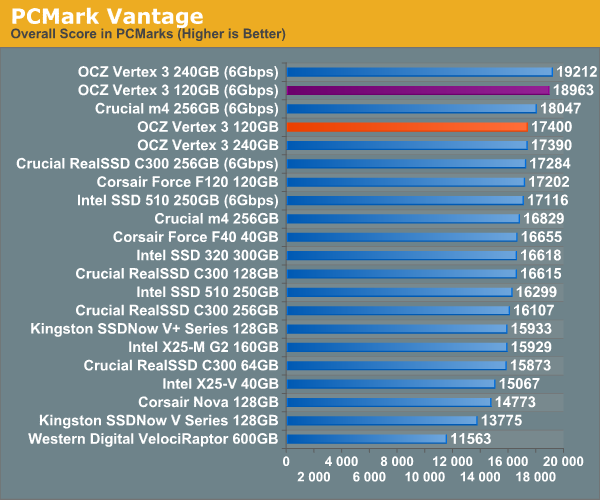
If we use PCMark as an indication of light system performance, the Vertex 3 120GB does pretty well here.
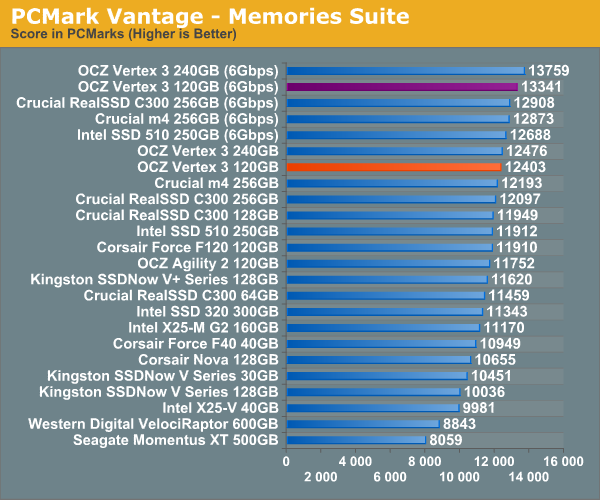
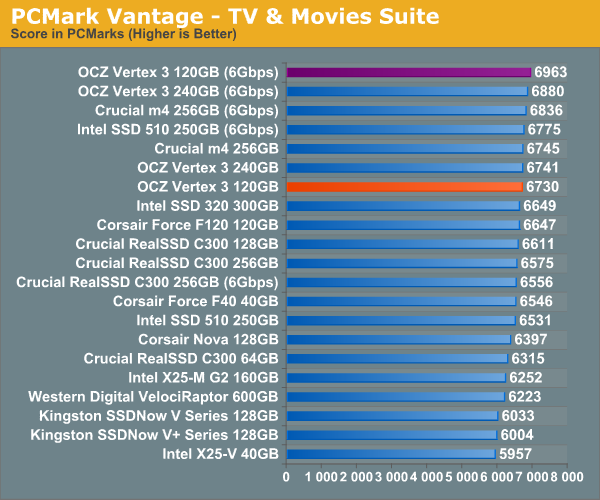
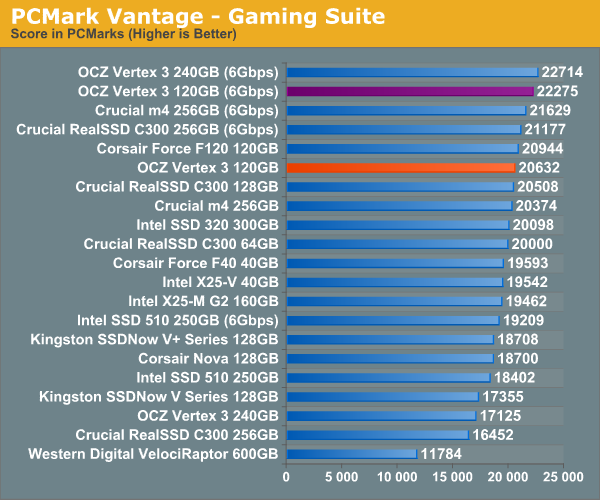
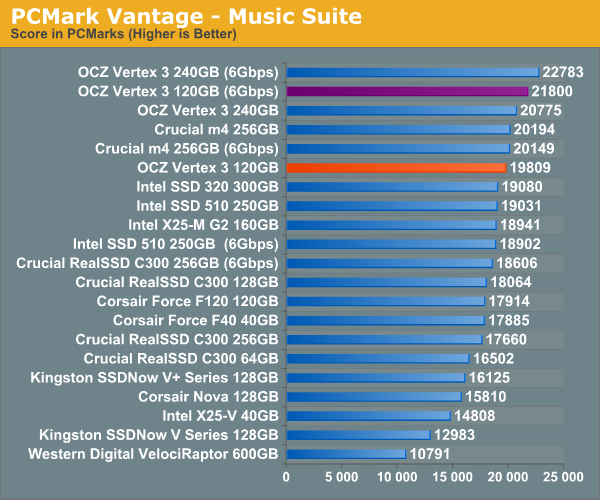
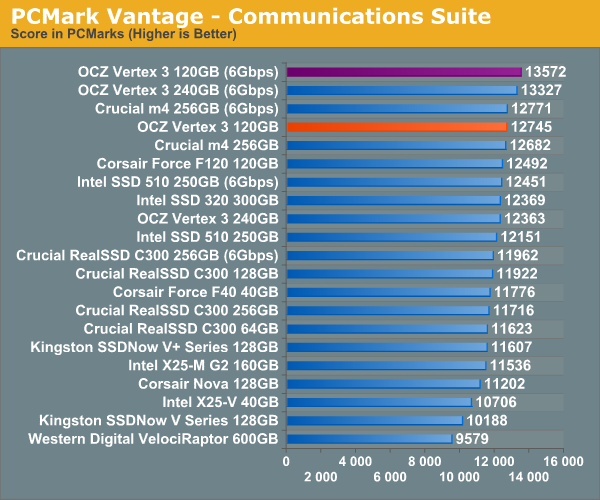
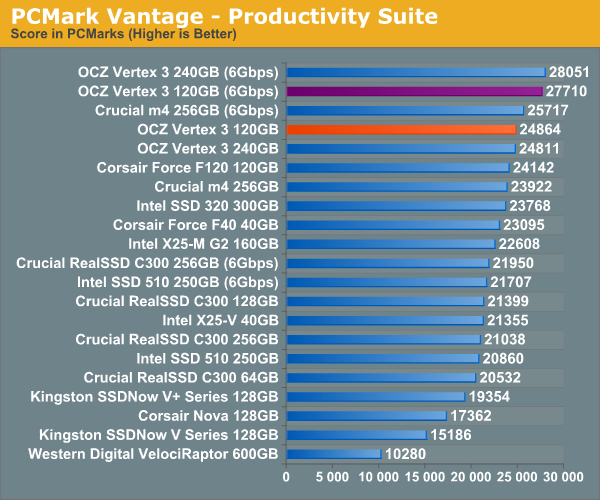
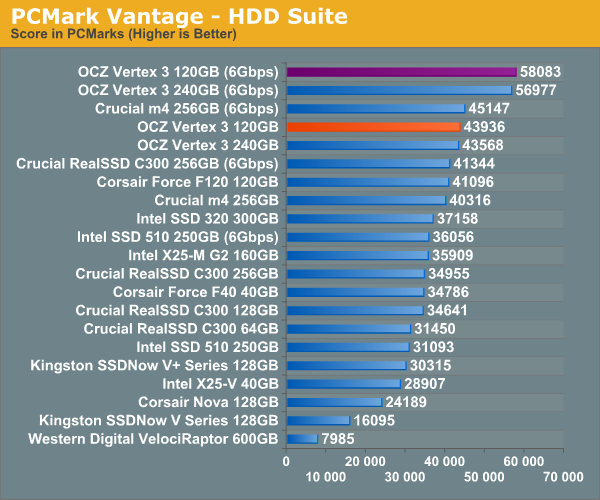










153 Comments
View All Comments
Xcellere - Wednesday, April 6, 2011 - link
It's too bad the lower capacity drives aren't performing as well as the 240 GB version. I don't have a need for a single high capacity drive so the expenditure in added space is unnecessary for me. Oh well, that's what you get for wanting bleeding-edge tech all the time.Kepe - Wednesday, April 6, 2011 - link
If I've understood correctly, they're using 1/2 of the NAND devices to cut drive capacity from 240 GB to 120 GB.My question is: why don't they use the same amount of NAND devices with 1/2 the capacity instead? Again, if I have understood correctly, that way the performance would be identical compared to the higher capacity model.
Is NAND produced in only one capacity packages or is there some other reason not to use NAND devices of differing capacities?
dagamer34 - Wednesday, April 6, 2011 - link
Because price scaling makes it more cost-effective to use fewer, more dense chips than separate smaller, less dense chips as the more chips made, the cheaper they eventually become.Like Anand said, this is why you can't just as for a 90nm CPU today, it's just too old and not worth making anymore. This is also why older memory gets more expensive when it's not massively produced anymore.
Kepe - Wednesday, April 6, 2011 - link
But couldn't they just make smaller dies? Just like there are different sized CPU/GPU dies for different amounts of performance. Cut the die size in half, fit 2x the dies per wafer, sell for 50% less per die than the large dies (i.e. get the same amount of money per wafer).A5 - Wednesday, April 6, 2011 - link
No reason for IMFT to make smaller dies - they sell all of the large dies coming out of the fab (whether to themselves or 3rd parties), so why bother making a smaller one?vol7ron - Wednesday, April 6, 2011 - link
You're missing the point on economies of scale.Having one size means you don't have leftover parts, or have to pay for a completely different process (which includes quality control).
These things are already expensive, adding the logistical complexity would only drive the prices up. Especially, since there are noticeable difference in the manufacturing process.
I guess they could take the poorer performing silicon and re-market them. Like how Anand mentioned that they take poorer performning GPUs and just sell them at a lower clockrate/memory capacity, but it could be that the NAND production is more refined and doesn't have that large of a difference.
Regardless, I think you mentioned the big point: inner RAIDs improve performance. Why 8 chips, why not more? Perhaps heat has something to do with it, and (of course) power would be the other reason, but it would be nice to see higher performing, more power-hungry SSDs. There may also be a performance benefit in larger chips too, though, sort of like DRAM where 1x2GB may perform better than 2x1GB (not interlaced).
I'm still waiting for the manufacturers to get fancy, perhaps with multiple controllers and speedier DRAM. Where's the Vertex3 Colossus.
marraco - Tuesday, April 12, 2011 - link
Smaller dies would improve yields, and since they could enable full speed, it would be more competitive.A bigger chip with a flaw may invalidate the die, but if divided in two smaller chips it would recover part of it.
On other side, probably yields are not as big problem, since bad sectors can be replaced with good ones by the controller.
Kepe - Wednesday, April 6, 2011 - link
Anand, I'd like to thank you on behalf of pretty much every single person on the planet. You're doing an amazing job with making companies actually care about their customers and do what is right.Thank you so much, and keep up the amazing work.
- Kepe
dustofnations - Wednesday, April 6, 2011 - link
Thank God for a consumer advocate with enough clout for someone important to listen to them.All too often valid and important complaints fall at the first hurdle due to dumb PR/CS people who filter out useful information. Maybe this is because they assume their customers are idiots, or that it is too much hassle, or perhaps don't have the requisite technical knowledge to act sensibly upon complex complaints.
Kepe - Wednesday, April 6, 2011 - link
I'd say the reason is usually that when a company has sold you its product, they suddenly lose all interest in you until they come up with a new product to sell. Apple used to be a very good example with its battery policy. "So, your battery died? We don't sell new or replace dead batteries, but you can always buy the new, better iPod."It's this kind of ignorance towards the consumers that is absolutely appalling, and Anand is doing a great job at fighting for the consumer's rights. He should get some sort of an award for all he has done.